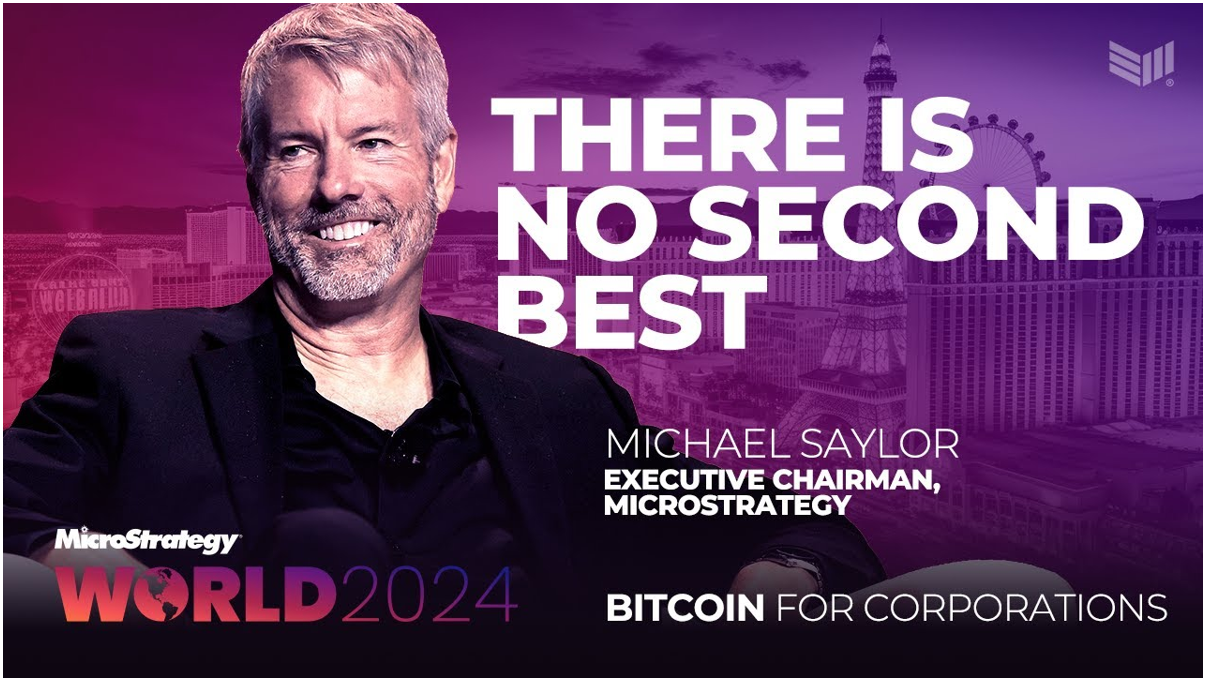Trending Now
- 1SOL
5
- 2ETH
3
- 3XRP
1
- 4BTC
-1
- 5fell
-4
- 6market
4
- 7trade
3
- 8transaction
2
- 9Binance
1
- 10network

Throughout history, countless assets have aspired to become 'perfect capital,' but all have failed. Michael Saylor argues that three conditions are necessary for perfect capital: technical perfection, economic perfection, and ethical perfection.
Saylor identifies technical perfection as the first condition for perfect capital. This goes beyond mere functional technology — it means the technology must be fundamentally sound and sustainable.

Saylor is an engineer. He studied engineering at MIT and lived as an engineering entrepreneur. Then, through expertise and technical insights he gained from decades of leading a prominent software firm, he went all-in on Bitcoin, not by himself, but with his company, too. (Source: Wired)
"For a digital asset framework to succeed, it needs to satisfy three conditions. It must be ethically sound, economically sound, and technically sound. Technical soundness is the most fundamental condition.
Bitcoin's technical perfection can be verified in multiple ways. First, it's protected by the most powerful computer network in the world. The hash rate is growing by 70% annually. This happens in bull markets and bear markets alike. It's an unstoppable force.
Do you know what 624 exahash means? It's a level of computing power that even Microsoft or Amazon couldn't defeat if they combined all their resources. This is a silicon machine. The genius of an open proof-of-work network is that highly intelligent engineers can harness the power of ASIC chips to create SHA-256 hashing that's 2,000 to 3,000 times more efficient than a general-purpose CPU.
GPUs aren't appropriate either. The Bitcoin network isn't threatened by all available GPU capacity. There's a wall of encrypted energy that stands in the way of anyone trying to undermine the network's integrity. No trick, no gimmick, no social attack can break through. This is raw digital power that's resistant to nation-states, corporations, malicious actors, and hackers."
Saylor's explanation of technical perfection presents the core evidence supporting Bitcoin's security and sustainability. He goes beyond abstract claims about Bitcoin's safety to demonstrate through specific metrics and technical architecture why its security is inevitable.
Bitcoin isn't simply a digital asset but an impenetrable system protected by the world's most powerful computer network. The hash rate, which represents Bitcoin's processing capability, increases by 70% annually — evidence that the network grows stronger with time. Unlike simple software or centralized databases, Bitcoin aggregates global computing power to form what Saylor calls "a wall of encrypted energy."
This wall isn't merely defensive; it's a security structure designed to make infiltration technically impossible for any entity. Bitcoin relies on ASIC (Application-Specific Integrated Circuit) chips that perform SHA-256 hashing with efficiency 2,000-3,000 times greater than standard CPUs. Consequently, attack attempts using conventional supercomputers or GPUs are fundamentally neutralized.
Moreover, the 624 exahash computing power means that hacking the Bitcoin network would require more processing power more than Microsoft and Amazon combined could muster. It's not merely a financial system but an independent digital infrastructure that even nations or major technology companies cannot control.
Saylor's "technical perfection" isn't just theoretical — it provides concrete evidence that Bitcoin is practically the most secure value storage medium. This technical soundness forms the foundation for Bitcoin to establish ethical and economic trust, creating a system that will only strengthen over time.

Bitcoin's annually increasing hashrate strengthens network security, with its growing computational power building trust in Bitcoin as a store of value and thus creating the foundation for sustained price appreciation. (Source: Look Into Bitcoin)
The second condition, economic perfection, refers to efficiency and sustainability as capital. Saylor explains that this isn't simply about high returns but about fundamental economic soundness.
"From an electrical perspective, it's fascinating. The network requires 20 gigawatts of electricity, equivalent to 20 nuclear reactors, but it's far better than 20 nuclear reactors because this electricity is distributed throughout the Earth. The network feeds on electricity, creating a dynamic that drives decentralization.
This network and its dynamics will continue to decentralize and spread. It will move away from population centers where electricity is expensive, toward places where electricity is stranded or needs recycling. And those 20 gigawatts create a thermodynamic connection between the virtual network and the physical world.
This is what makes the network stable. This is what makes it ethical and politically sound. The fact that electricity from a dam in Bhutan or from volcanoes in South America or Africa powers this network means it will be a global, neutral asset. No one can centralize the Bitcoin network on top of a single data center."
Saylor's analysis of economic perfection is unique. Rather than using traditional financial metrics, he explains Bitcoin's economic soundness through the lens of energy and physics, suggesting that Bitcoin is an energy-economic system rather than a simple financial product.
Bitcoin preserves economic value through the concept of "digital energy." Saylor explains that Bitcoin is an asset transformed from energy. Just as we use physical resources like oil or electricity to create value, energy is converted into digital form through Bitcoin mining and preserves its value. Thus, Bitcoin is a digital asset that doesn't economically deteriorate, and its value will inevitably strengthen over time by design.
He especially emphasizes that Bitcoin's mining system is naturally designed to pursue economic efficiency. Miners will always seek the cheapest electricity, ultimately creating a system that most efficiently utilizes surplus energy worldwide.

Hal Finney, the most likely candidate for Satoshi Nakamoto, was diagnosed with ALS in 2009 – the year Bitcoin was first launched. He died in 2014 at age 58. Ironically, Bitcoin — possibly his masterpiece — was perfected by his very death. (Source: Wired)
Saylor's third condition, ethical perfection, is particularly noteworthy. He argues that capital must be ethically sound beyond technical and economic efficiency.
"Bitcoin provides truly ethical capital for the first time in history. It's open, permissionless, transparent, and decentralized. It's a fair and equitable way to settle differences between global counterparties with conflicting interests.
This isn't just a path to peace. It's a path to prosperity. It's a global monetary network giving equal property rights to all economic classes in every nation.
When I talk about perfect capital, ethical perfection comes to mind first. Even if something is technically and economically perfect, it cannot survive long-term if it's not ethical. The most important thing Satoshi did was walk away after creating Bitcoin.
This is the 'Immaculate Conception'. It's such a simple idea, yet none of the 2.5 million coins that have copied Bitcoin understood this simple idea. Satoshi created Bitcoin, gave it to the world, and left. No major company in the world has ever been established this way.
If you want speculative, manipulative assets, there are all the other crypto assets. But if you want truly ethical and sustainable capital, Bitcoin is the only choice because it's an asset without an issuer."
Saylor's emphasis on ethical perfection highlights that Bitcoin isn't merely a technically and economically superior asset but fundamentally a fair and sustainable system. He argues that Bitcoin is history's most ethical capital, not as an abstract philosophical concept but because its design principles and operation inherently embody ethical values.
First, Bitcoin is an open network available to everyone. Traditional financial systems are controlled by specific institutions or governments, potentially disadvantaging individuals or certain countries, but Bitcoin is a global asset equally accessible regardless of nationality, economic background, or social class. This makes it ethical not just as a financial innovation but as a system providing fair economic opportunity worldwide.
Second, Bitcoin is an asset without an issuer or controller. By creating Bitcoin and then disappearing, Satoshi Nakamoto ensured that no individual or organization could own or manipulate Bitcoin. This fundamentally distinguishes Bitcoin from all other assets. Traditional currencies or assets can be issued and manipulated by central banks, governments, or corporations, but Bitcoin operates as an independent network controlled by no one.
Third, Bitcoin is humanity's most transparent financial system. Every transaction is recorded on the blockchain and can be verified by anyone. Traditional financial systems may allow insider trading or corruption, but Bitcoin eliminates opaque power structures, realizing ethical values through the system's inherent trust.
Saylor suggests these characteristics make Bitcoin not merely an investment product but an inevitable tool for humanity to create a fair economic order. His concept of ethical perfection explains beyond simple moral values why Bitcoin will continuously gain trust and maintain itself over time. Regardless of technical excellence and economic power, an asset with ethical problems cannot survive long-term — Bitcoin's durability and prosperity are inevitable consequences of its ethical design.
Saylor argues that Bitcoin is the only asset satisfying all three conditions. He explains that all other crypto assets fail in at least one of these conditions.
"Understanding why Bitcoin is unique is crucial. All other crypto assets have issuers. They create the coins, control the protocol, and operate the network. These are fundamentally centralized systems.
Bitcoin is completely different. Satoshi created Bitcoin but surrendered control of the protocol. He gave up the Satoshi coins and stopped trying to influence the network. It was a gift to the world. That's why it became an asset without an issuer.
If you examine the next 100 cryptos and work your way down, you'll find it very difficult to find an asset with these characteristics. In fact, this is a much simpler test than the Howey test. If you created something, did you give it all away to someone else? Did you never sell it? And are you gone and not arguing over it? Then maybe it is a digital commodity.
One simple piece of advice: if you want to create a digital commodity, give it away and leave. Bitcoin isn't just the best digital commodity; it's the best commodity. Bitcoin is the world's first digital commodity. Everything else is a physical commodity, and because it's not digital, the supply isn't fixed. This makes Bitcoin superior to gold."

Among Saylor's famous Bitcoin quotes, the most renowned is 'There is no second best.' According to him, Bitcoin's unique completeness as an asset makes any alternative impossible. (Source: MicroStrategy World)
Saylor's analysis clearly demonstrates Bitcoin's uniqueness. According to his analysis, all other crypto assets are ultimately under some form of centralized control, preventing them from becoming 'perfect capital' in the true sense.
Particularly noteworthy is Saylor's concept of 'Immaculate Conception.' This isn't merely a technical characteristic but represents the meeting point of technical, economic, and ethical perfection. Satoshi's creation of Bitcoin and subsequent disappearance wasn't simply a matter of anonymity but an essential condition for achieving all three forms of perfection.
This perspective offers an entirely new framework for understanding Bitcoin. While most analysts view Bitcoin as a technological innovation or investment vehicle, Saylor interprets it as the first 'perfect capital' combining technical, economic, and ethical perfection.
Saylor's analysis also explains why Bitcoin cannot be replicated. Other crypto assets may copy Bitcoin's technical characteristics, but they can never reproduce the ethical perfection created by Satoshi's 'exit.' This ensures Bitcoin's unique position in perpetuity.
In conclusion, Saylor's three conditions for perfect capital aren't merely theoretical distinctions but key factors determining the long-term survival and prosperity of capital. From this perspective, Bitcoin isn't simply a digital asset or speculation vehicle but the first 'perfect capital' in human history satisfying all three conditions.
This view also has important implications for Bitcoin's future. If Saylor's analysis is correct, Bitcoin transcends mere financial innovation to become an invention of civilizational significance. It represents the ideal of 'perfect capital' that humanity has instinctively sought for thousands of years, suggesting that global capital will inevitably flow into Bitcoin.